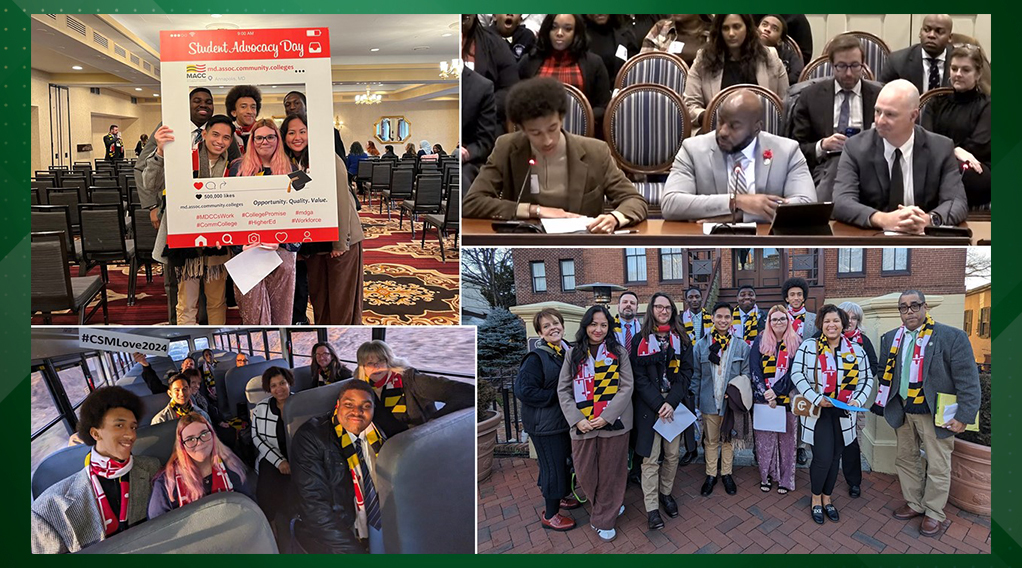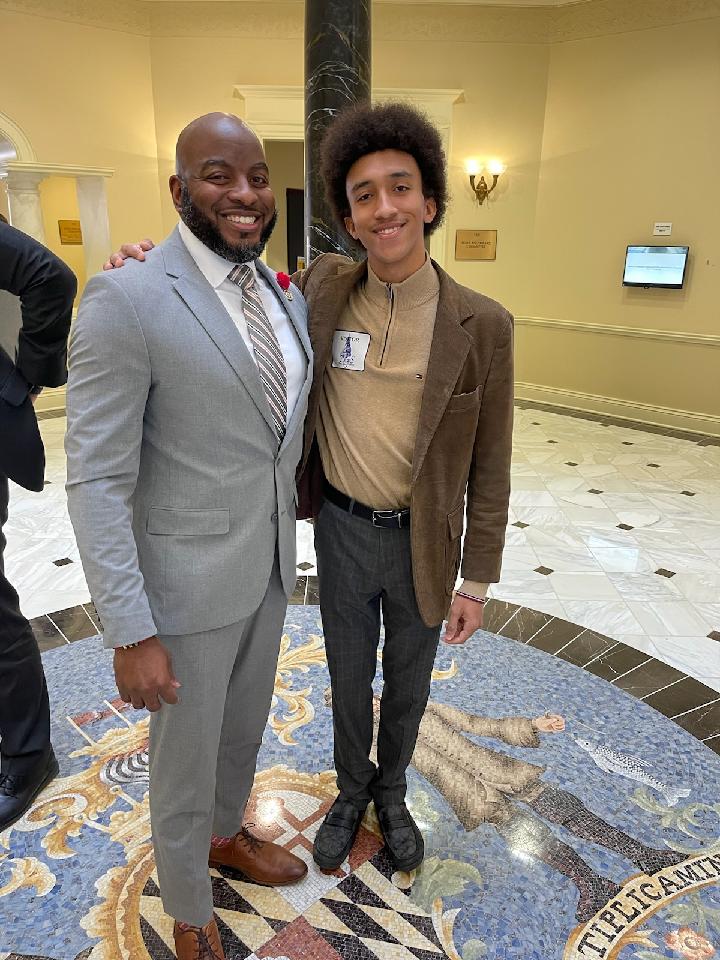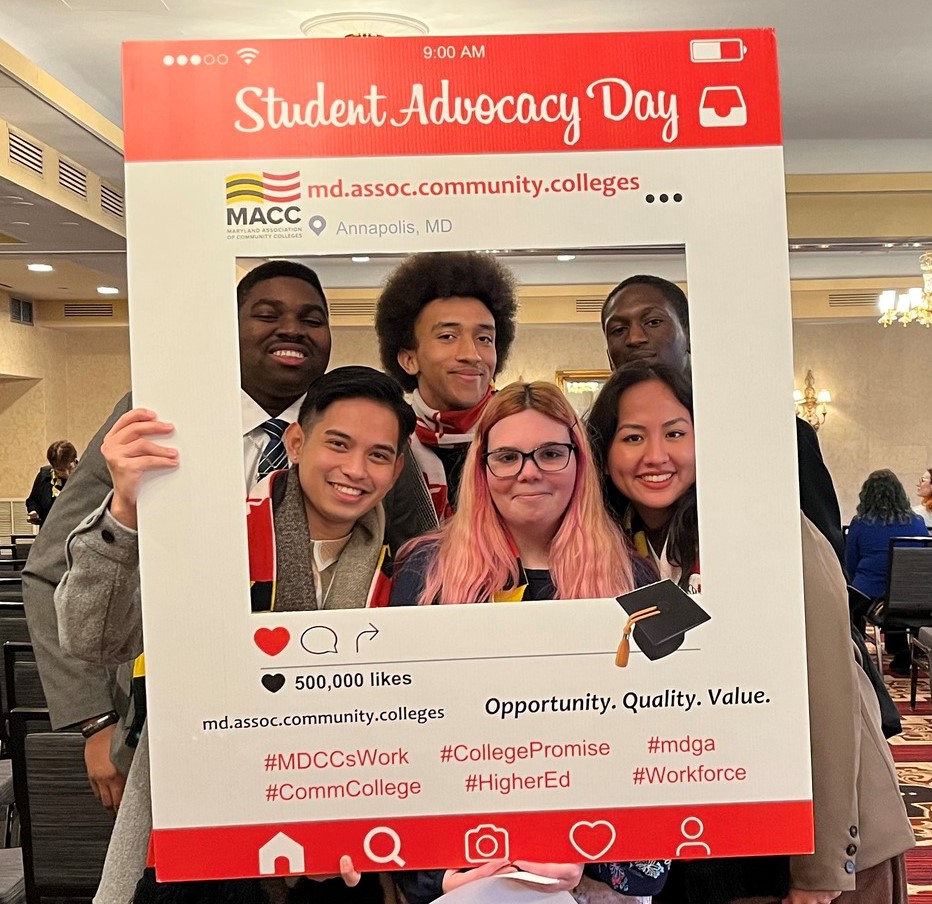CSM Students Travel to Annapolis, Advocate to Keep Community Colleges Affordable and Accessible for All

First-year College of Southern Maryland (CSM) student Denzel Chance travelled to Annapolis today to testify before the Maryland House of Delegates Appropriations Committee in support of House Bill (HB) 0607 – a bill that if passed would make it easier for students pursuing noncredit workforce certificates, licensures, or apprenticeship programs to receive the Maryland Community College Promise Scholarship. It is the second time in two weeks that Chance, who is a Promise Scholarship recipient himself, visited Annapolis to meet with his representatives, share his CSM story, and support fellow students.

“Honestly, if I had not received the Promise scholarship, I would not be at CSM and I wouldn’t have time to easily give back to my fellow students or community,” Chance testified. “I wouldn’t be developing strong leadership skills or making important connections. And I wouldn’t be able to help solve the issues that relate to not just my college but also in my community. Maryland’s Promise scholarship has made this all possible. Just imagine how much more our communities could benefit if our noncredit students could as easily access this Promise, too.”
Since establishing the Maryland Promise Scholarship Program in 2019, the very premise has been that college is for everyone, echoed CSM President Dr. Yolanda Wilson in her written testimony in support of the bill.
“For the College of Southern Maryland, this Promise has been extended over the past five years to 870 students, totaling $2.6 million,” she continued. “The key points of HB 607 address the ability to increase access for students by further expanding the recent adjustments in the Promise criteria that opened funding to students enrolled part-time, starting in 2023-2024.”
She added that while non-credit students are eligible for the Promise scholarships, the current process is complex, requiring completion of the FAFSA and a non-credit application.
“We may not know how many more students might have taken advantage of the Promise program if the FAFSA requirement were not in place, but we do believe that requiring students to complete the FAFSA to be considered for non-credit Promise is a step that causes extraordinary confusion.” she pointed out. “HB 607 removes this barrier and increases access for our non-credit students.”
Students Rally During Advocacy Day
For Chance, of St. Mary’s County, today’s visit to Annapolis was an opportunity to further his civic engagement with his local lawmakers. It came on the heels of the annual Maryland Association of Community Colleges (MACC) Student Advocacy Day Feb. 6 where he and fellow CSM students joined peers from Maryland’s 16 community colleges to advocate for issues and bills that directly impact the state’s 500,000 community college students.
During MACC Student Advocacy Day students attended a rally to hear from MACC Executive Director Dr. Brad Phillips, supportive legislators, and a student from Howard County Community College. The presenters explained that the state’s proposed fiscal year 2025 budget, including the Budget Reconciliation and Financing Act (BRFA) which if passed includes the fourth largest cut – $22 million – to community college funding in Maryland history.
With the budget not yet final, and the BRFA still to be heard by the General Assembly, students were encouraged to promote full funding for community colleges in accordance with the Cade Funding Formula, which prescribes that Maryland’s support for community colleges be 29 percent of its support of Maryland's public four-year institutions. The current budget calls for 26.5 percent.
“We must be funded adequately and seen as equal to our four-year institutions,” Phillips told the students. “[Our legislators] have to make hard decisions, but they also have to understand their prior commitments.”

Chance joined fellow CSM students Diante Keita and Kiley Tewell of Charles County; Genesis Ingal and Gabriel Gomero Toscano of St. Mary’s County; and Diallo Taylor of Calvert County during student advocacy day to visit nearly one dozen senators, delegates, and staff representing the Southern Maryland delegation. The group shared how CSM has met their needs and why the proposed budget cuts are ill-advised.
“While I'm only in my second full semester at CSM, I have already been able to join a multitude of clubs and programs, including the Men of Excellence and CSM’s EXITO club,” said Chance. “One of the most satisfying experiences is the CSM’s Volunteer Squad where I give back to my community. Last fall our squad joined other colleges at Morgan State University to package more than 50,000 meals which were delivered throughout Maryland. We brought back 2,000 meals for our CSM Hawk Pantries on each campus. We also help a local soup kitchen and food drives.”
Tewell took the opportunity to bring her concerns about accessibility to the forefront. The 19-year-old psychology student explained that she has vision problems that prevent her from driving and by attending college close to home her family and friends are able to help with transportation.
“If I didn’t go to CSM, I would be dependent on who knows what,” shared Tewell. “CSM has allowed me to learn more about myself, but also keep the doctors that I have learned to love. CSM is the reason I will be able to get an education and become a [physical assistant].”
Meanwhile, CSM helped Taylor to set ambitious goals. He told representatives that his classes at CSM have inspired his dream of opening a youth-focused small business in the community, and although he will finish his hospitality management certificate this year, he intends to take advantage of his current momentum and continue working toward his associate degree.
The students also discovered unexpected CSM connections along the way. They met with Del. Dr. Edith Patterson who they learned was a former, longtime CSM employee. They also discovered that many legislators have friends and family members who attended CSM, and that Del. Jeffrie Long employs CSM student Cameron Gross in his office.
Senators and delegates representing the Southern Maryland delegation listened to the students’ stories, shared insight into the legislative process and the bills inspiring debate this session, and encouraged the students to apply for their respective delegate and senate scholarships. They also offered words of advice for the students as they complete their education and begin their professional lives.
“Know who you are,” Patterson coached the students. “When the decisions come, and they will, you have to know who you are. Have ethics, have courage, and make good decisions.”
 my.CSMD
my.CSMD